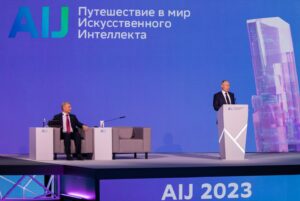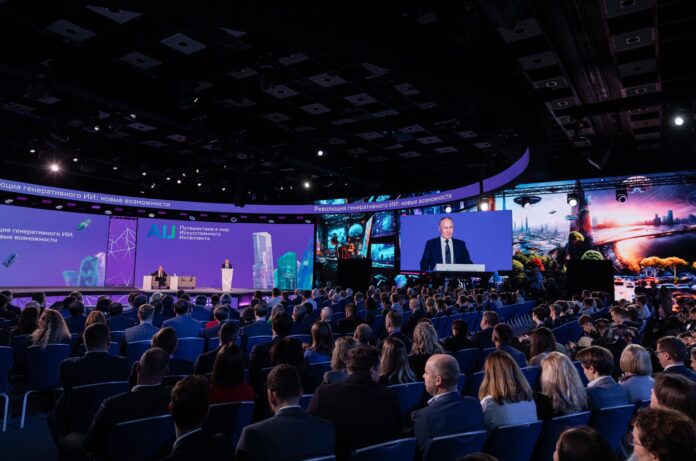As part of the AI Journey international conference, President Vladimir Putin shared his vision of AI development in Russia
Kuala Lumpur, 30 November 2023 – The AI Journey international conference hosted the main discussion, The Generative AI Revolution: New Opportunities, attended by President Vladimir Putin and moderated by Sberbank CEO and Chairman of the Executive Board, Herman Gref.
As Herman Gref noted, the agenda of the discussion focused on what generative AI can give mankind, how it can expand the capabilities of each person.

Vladimir Putin said, “Over the past year, Russia’s economic and social sectors have expanded the use of AI solutions by a factor of 1.5. Investments in this area are growing, and companies are solving their production tasks more and more efficiently thanks to AI.”
However, the integral dimension of the efforts comprises not only business indicators but also people’s growing trust in the new, end-to-end, universal, and, in fact, revolutionary technology. With the introduction of artificial intelligence in science, education, healthcare, and other spheres, humanity is starting a new chapter in its existence.
Russian citizens see how AI makes many everyday processes simpler and more convenient, improves the quality of management, and mechanisms for providing public services, and is increasingly used in organizations, enterprises, and regions. Vladimir Putin emphasized generative AI development, which writes program code, generates blueprints and spare part designs, is gradually beginning to be used in the design of structures and buildings, reduces the time of searching for the best molecules to create medicines, and creates movies, music, and poems. These are just some of the areas where the machine’s abilities are equal to, or even exceed, those of humans.
This means that generative AI technologies are no longer primitive executors of our commands. Next-gen technologies are actually becoming humans’ partners in various fields and spheres. For businesses and states today, this is a key resource to becoming super-efficient.
The President believes that by using generative AI, companies can create products and services with unique characteristics at the request of a specific consumer. These breakthrough solutions open the way to the creation of a whole range of new business models, which makes it possible to reduce losses, implement lean manufacturing principles, and significantly increase labor productivity.
The application of AI can bring huge opportunities to the sphere of public administration. This is a complete transition to data-driven management, which will make it possible to automate even more administrative procedures and accelerate decision-making processes based on big data, which means radically improving and changing the appearance of many spheres that directly affect every citizen.
However, the President added that artificial intelligence will not replace a medical worker or a teacher, but it can serve as their faithful and effective assistant; e.g., it can give teachers more time to educate children, help doctors prevent and detect diseases at an early stage, and be used for remote monitoring of people’s health.
Vladimir Putin also announced that a new version of the National Strategy for the Development of Artificial Intelligence will be approved in the near future, taking into account the rapid development of generative models. He emphasised the importance of access for school children and undergraduate and graduate students to supercomputers for training AI models, increasing the capacity of Russian supercomputers by at least one order of magnitude, expanding training in this area, and directing additional funds to research in the field of generative AI and large language model development.
According to the President, Russia is among the few countries that have their own generative AI technologies, and this competitive advantage should be strengthened. We need to think about developing large industry models drawing on generative AI and implementing them to increase labor productivity and wages in key areas of the Russian economy. Special advanced training programs are also needed for this purpose.
Herman Gref added that another important task was to create trusted artificial intelligence. More advanced models are already able to point out that less advanced models have some flaws in the datasets and show how to solve these problems. In the same way, more advanced models can be used to solve the “black box” problem, i.e., to explain why the AI made this or that decision.
Herman Gref outlined three main areas in which AI, according to expert forecasts, will make the greatest breakthroughs: healthcare, education, and the construction of fundamentally new management systems. The following speakers focused on AI development prospects in these three areas.
Andrey Tyazhelnikov, Chief Physician of Medical Center No. 220 in Moscow, explained that the fastest possible development of AI in medicine requires data, the receipt of which must be underpinned by an appropriate infrastructure, which is already in place and is being actively improved. More than five million electronic medical documents are being generated in the country. In Moscow alone, AI has already established 12 million preliminary diagnoses. As a result, in the future, digital assistants will be available to both doctors (to minimize routine and give them more time to work with patients) and to patients (to help them stay healthy).
Natalia Troyanovskaya, Deputy Headmistress of School No. 186 in Nizhny Novgorod, spoke about working on a digital platform that helps every student find his or her vocation and discover his or her talent. The platform makes it easier for teachers to prepare lessons, increases children’s motivation for learning, and enables a personalized approach. Artificial intelligence can also reduce the teacher’s workload.
Vladislav Kozhemyakin, head of the SberClass platform, added that personalized AI can increase learning efficiency by an average of 30%, boosting learners’ engagement and reducing their stress. Also, it takes some of the teacher’s workload, e.g., by automating homework checking. Alyona Kochorova, head of the direction of Sberbank’s Industrial AI Implementation Center, explained how AI was being adopted in public administration, particularly in Moscow Region. Other countries thrive in using large language models, too, in the pension system, to notify stakeholders about subsidies, and so on. In Russia, AI solutions are now being introduced into the public administration system in 67 regions. Alexander Gasnikov, rector of Innopolis University, noted that four aspects were critical for AI development: working with data, computing resources, algorithms and human resources. This is where efforts should be focused. The work with human resources starts in junior high school, when it is important to get children interested in AI. Grants for adult researchers are also of great importance.
Other speakers engaged in the discussion were the governor of Moscow Region Andrey Vorobyov and Kemerovo Region Governor Sergey Tsivilyov, who spoke about how AI was being implemented in their regions. School 21, a free programming school by Sber, trains sought-after IT professionals in six regions of the country, giving students aged 18 and above a free opportunity to acquire applied IT skills, while companies get highly qualified specialists for digital transformation in Russian regions. Campuses are scheduled to open their doors in 16 more cities across the country. This project is being implemented in several Russian regions, in some cases on instruction from Russian President Vladimir Putin.
Ilya Grinyuk, a 17-year-old schoolboy, winner of the All-Russian AI Olympiad, also spoke at the session.
At the end of the discussion, the President of the Russian Federation noted that Russia needed an AI evolution, but this evolution must be organized quickly, in a quality manner, efficiently, and affect all levels: businesses, municipalities, constituent entities of Russia, federal authorities, in all aspects of life. This is what we should aspire to achieve, and this goal requires concentration of all our intellectual, administrative and financial resources, if we want to secure the future of the country.
